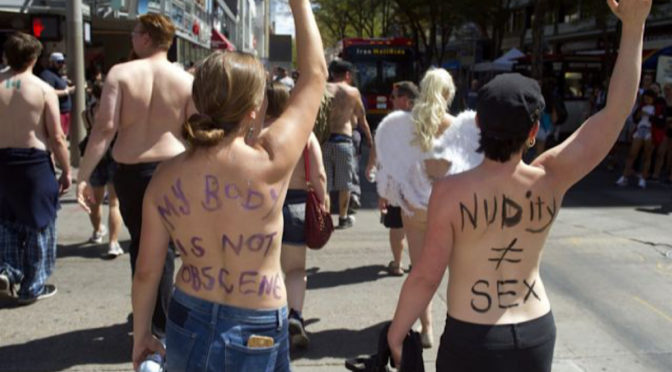The Free the Nipple movement has been one subject to constant controversy, and simultaneously, one that has picked up speed in recent years. I find it exceptionally fascinating, because it perfectly captures the paradox between the desires of the male gaze and being labelled a slut.

Spurred by director Lina Esco’s brave production of real-life protests in New York City, the film that started the movement sought to expose the double standards between male and female anatomy. Why is that the organ that provides life and sustenance to children is inherently seen as sexual? Why is that the sexualization of a girl’s body starts so young?
The answer, as it usually is, is unbridled misogyny. We know from crime statistics that even in countries where women are legally required to cover up from head to toe, sexual violence still occurs. The answer to stopping assaults does not lie in how we teach our daughters to dress, but rather in how we teach our sons to act. Consent is not clothing.

Something that I find absolutely infuriating is that for most women, freeing the nipple is not a political statement. It’s not that deep. Why do most men go shirtless? It’s just comfortable. And to make matters worse, the sexualization of female-presenting bodies contributes to never-ending cesspool of capitalism. Bras, pasties, push-ups… it gets exhausting to be constantly sold things that give mixed signals about concurrently enhancing and repressing one’s sexuality.
A quote from author Violet Rose can help put into perspective the inherent profit the patriarchy gains from making nipples taboo:
“It is illegal for women to go topless in most cities, yet you can buy a magazine of a woman without her top on at any 7-11 store. So, you can sell breasts, but you cannot wear breasts, in America.”
The sexualization of women’s nipples is not one that comes out of concern for our safety – it is a pointed statement on our lack of autonomy over our own anatomy. Further, we are not even free in the digital world. Instagram and Facebook immediately take down any photos where female-passing bodies are topless – where did freedom of speech go? Why is that these companies let hate speech run rampant, but a simple post of a woman’s body is too much to handle?
These are questions that I will not be able to answer for my future daughter without explaining the cruelty of living in a patriarchy. This fact saddens me to my core, and though it seems like a trivial matter for the feminism movement to be focusing on when so many issues around the world are also occurring, it is one that must not be overlooked.

The simple conclusion to the matter is wear what you want. Either way, women will be demonized, called “nasty”, and be subject to the male gaze, so you might as well do what you find most comfortable. The more we normalize what is simply part of the female anatomy, the closer we get to achieving gender equality. Baby steps are still strides that we should take pride in.

Hi Shreya!
Great post, as always, I’m impressed by you your depiction and commentary on important, relevant topics affecting women. I think this topic specifically plays into many other related ideas, like the “What were you wearing?” exhibit and controversy over whether women should wear bras or shave their body hair, etc. It is so true that all of these things were created in a patriarchal society, and there is a lot of hypocrisy in our laws. Thanks for bringing this important topic to light!
I loved everything about this blog, Shreya. Fashion is something that should be curated to individual preference. If you want to dress more conservatively, dress more conservatively. If you want to wear nothing but a bra and underwear, wear a bra and underwear. It saddens me how men like to dictate what women can or cannot wear, but it hurts me the most that anything we wear can be sexualized. I appreciate you shedding light on this topic and this movement because it is important for our society to understand that clothing should never be sexualized.